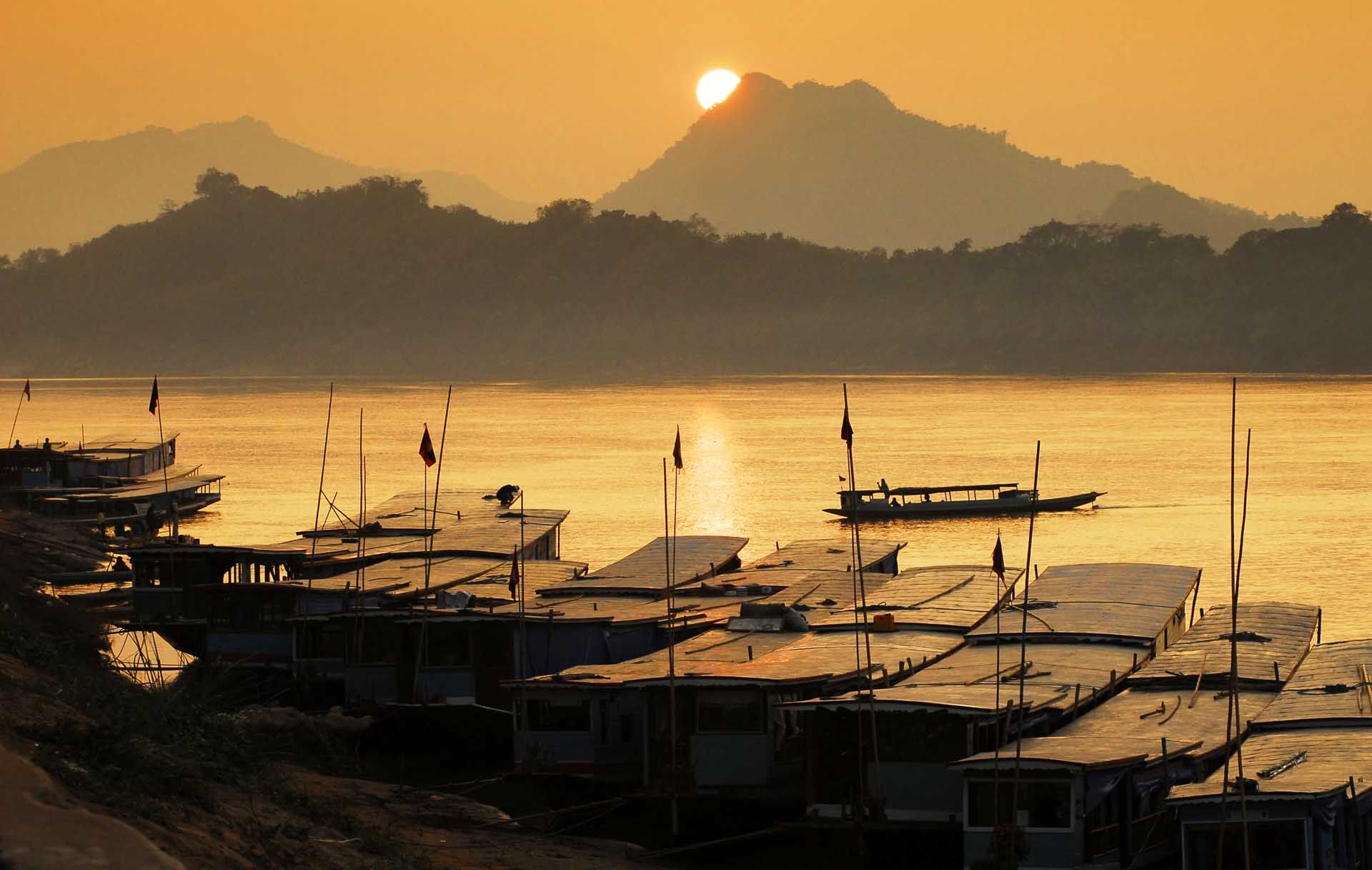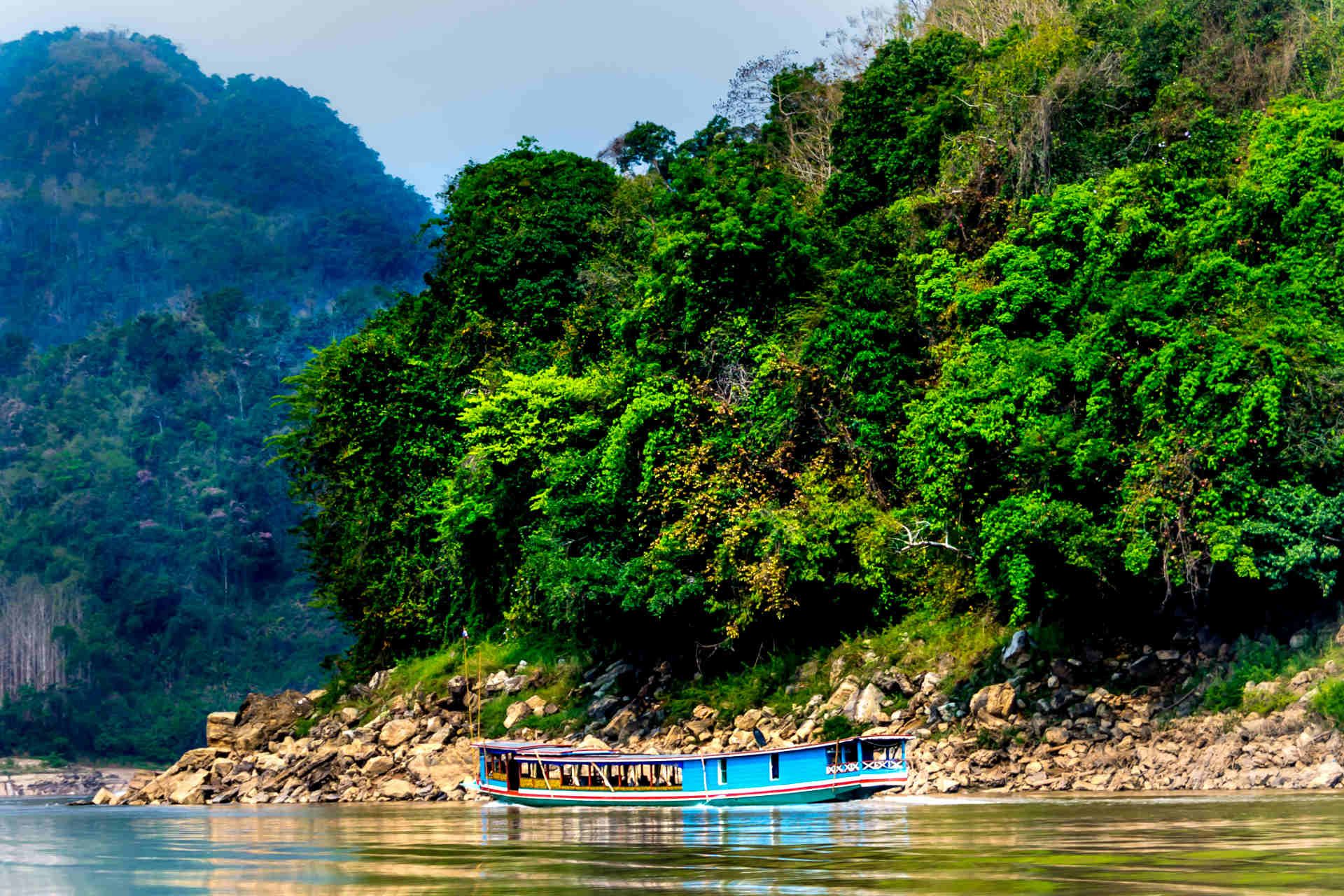Travel advice for Laos
From travel safety to visa requirements, discover the best tips for visiting Laos
Book your individual trip, stress-free with local travel experts
One night you’re sleeping under mosquito netting in a riverside bungalow. The next, you're sipping Beerlao on the terrace of a faded French villa. This isn’t a country of polished lobbies and rooftop pools. It’s about slow mornings, crooked floorboards, and views that don’t need a filter.
Figuring out where to stay in Laos is part of the adventure. In Luang Prabang, old timber houses have been turned into quiet guesthouses with jasmine-scented gardens and creaky verandas. Up north, you’ll find mountain lodges near Phongsali, or bungalows in Nong Khiaw with nothing but jungle and limestone cliffs beyond the hammock.
Down south, things get even more laid-back. Sleep in stilted huts on Don Det, or hole up in a coffee farm cabin on the Bolaven Plateau. Hot water might be optional, but good coffee isn’t. And while proper luxury is rare, comfort comes easy when you’re surrounded by this much calm.
Laos won’t blow your budget – but what you get in return is real value, especially if you care more about charm than thread counts. From hammock-strung bungalows to converted heritage homes, accommodation in Laos punches above its weight, even at the lower end.
Budget stays are everywhere, especially in backpacker hubs like Vang Vieng, Luang Prabang, and the Four Thousand Islands. Expect to pay $10-25 (€9-23) a night for simple guesthouses or dorm beds. Rooms are basic – fan or AC, mosquito net if you’re lucky – but often come with perks like a riverside view, communal kitchen, or a banana pancake breakfast. The plumbing may groan, but the welcome is usually warm.
Mid-range options – from $30-80 (€28-75) a night – get you more comfort without losing the local feel. That could mean a teakwood villa in Luang Prabang, a jungle lodge in the north with solar power and organic meals, or a riverfront stay in Champasak with bicycles to borrow and sunset cocktails on the deck. You’ll usually get private bathrooms, decent Wi-Fi, and a proper breakfast (sticky rice included).
Luxury in Laos isn’t flashy, but it’s well-crafted. Think eco-resorts in the mountains around Muang La, or stylish retreats just outside Luang Prabang where you can soak in a hot tub after a day of temple-hopping. Prices start around $100 (€93) and climb from there, especially at the top-end wellness resorts. Don’t expect marble lobbies and butlers – but do expect quiet, privacy, and settings that feel totally unplugged from the rest of the world.

Mekong River, Luang Prabang port in Laos © i viewfinder/Shutterstock
Laos doesn’t deal in big brands or cookie-cutter hotels. Accommodation in Laos is more relaxed – usually smaller, locally run, and all about the setting. One night you might stay in a teak guesthouse in Luang Prabang, the next in a hammock-strung bungalow by the Mekong. The comfort level varies, but the hospitality rarely does.
Here’s what to expect from the types of places you’re most likely to stay in Laos.
From $10 (€9) per night
These are the bread and butter of Lao travel – cheap, family-run, and found in nearly every town and village. Expect simple rooms with fans or AC, mosquito nets, and maybe a creaky bed frame. Shared bathrooms are common at the lower end. What you get in return: home-cooked meals, local tips, and a host who might introduce you to their chickens or lend you their scooter.
From $15 (€14) per night
From the Four Thousand Islands to Nong Khiaw, basic bungalows are a classic Lao experience. Often built from wood or bamboo and set right by a river or rice field, they’re rustic – but that’s the charm. Some have hammocks and private porches; others are barely more than a bed and a mosquito net. Don’t expect soundproofing, but do expect sunrise views and frog choruses.
From $30 (€28) per night
If you want comfort without losing character, this is where Laos shines. Think French-colonial villas in Luang Prabang, converted homes with local textiles, or stylish stays in Vang Vieng that ditch the backpacker vibe for mountain views and good coffee. Many include breakfast and have staff who’ll help arrange treks, boat trips, or cooking classes.

Mekong River, Laos @ Shutterstock
From $40 (€37) per night
Scattered across the north and central highlands, ecolodges in Laos are usually remote and relaxed. You’ll find solar power, compost toilets, rainwater showers, and a strong focus on sustainability. Some are community-run, especially near national parks, and your stay directly supports local conservation or village initiatives.
From $100 (€93) per night
Luxury here is more about setting than sparkle – private villas in the jungle, riverside resorts with infinity pools, or spa retreats outside Luang Prabang with serious design credentials. You’ll get air-con, private terraces, strong cocktails, and silence. It’s low-key but well done. And while the options are few, they’re worth the splurge.
From $50 (€47) per night
More common in Vientiane or Luang Prabang, these are ideal for digital nomads, slow travelers, or families. You’ll get more space, basic kitchen gear, and usually AC and Wi-Fi. Great for doing your own thing, though don’t expect stylish decor – this is function over flash.

Nam Ou, Nong Khiaw River, Laos @ Shutterstock
Laos is still one of Southeast Asia’s best-value destinations. You don’t need deep pockets to sleep well here – especially if you’re happy with simple rooms and a bit of character over polish. On average, expect to pay $10-25 (€9-23) for a basic guesthouse or riverside bungalow, $30-60 (€28-56) for a more comfortable boutique stay, and $100+ (€93+) for top-end resorts and jungle hideaways. Dorm beds usually go for $5-10 (€5-9), while well-run ecolodges and remote nature retreats range from $60-120 (€56-112) depending on location, views, and how many extras are included.
Breakfast is often included, especially in mid-range places – usually eggs, fruit, baguette, and strong Lao coffee. Cheaper places might throw in a banana and some instant coffee, or just point you to the nearest noodle stall. Wi-Fi is usually free, but power outages aren’t unheard of in more rural areas. Always check if there's hot water (not guaranteed), and whether pickup from the nearest bus stop is included – especially if you’re heading somewhere out of the way.
Laos might be small, but the differences between regions are huge – from French-influenced river towns to jungle outposts where Wi-Fi barely makes an appearance. Choosing where to stay in Laos isn’t just about logistics – it shapes the kind of trip you’ll have, whether you’re into lazy rivers, mountain hikes, or strong coffee with a view.
This UNESCO-listed town is Laos at its most graceful. Golden temples, colonial buildings, and a sunset-ready riverfront make it a firm favorite.
Once known for tubing and chaos, Vang Vieng’s grown up. It’s now a base for outdoor activities, surrounded by karst cliffs and green valleys.

Song River at Vang Vieng, Laos @ Shutterstock
For travelers chasing landscapes over landmarks. Nong Khiaw sits on the Nam Ou River, surrounded by jungle and limestone peaks.
The south is where Laos slows down. Waterfalls, coffee farms, and island life – it’s all here, just less developed.
Laos’s capital is low-key for a capital, but worth a stop if you’re flying in or out.

Wat Phra That Luang, Vientiane © Gaid Kornsilapa/Shutterstock
Laos travel tips don’t stop at border crossings and bus schedules – they matter when you’re booking a place to sleep, too. It’s not about star ratings. It’s about timing, location, and knowing how things actually work on the ground. Pick right, and you’ll be swinging in a hammock with river views and a bowl of noodles. Pick wrong, and you’re stuck in a windowless box next to an all-night karaoke joint. Here’s how to avoid that.
From travel safety to visa requirements, discover the best tips for visiting Laos
written by
Rough Guides Editors
updated 15.05.2025
For over 40 years, Rough Guides has been a trusted name in travel, offering expert-curated guides, inspiring articles, and tailor-made trips. Our passionate team of writers and local travel specialists provide in-depth insights into destinations worldwide, from iconic landmarks to hidden gems. We help you travel smarter and experience the world authentically.